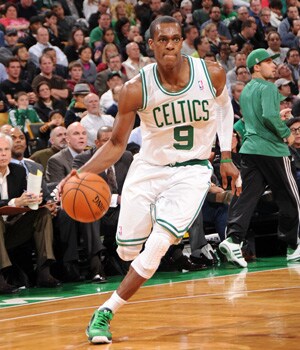By Marc D'Amico
Celtics.com
November 27, 2012
WALTHAM, Mass. – The NBA has changed in many ways over the course of the past decade. One of the greatest changes of all is that it is now a perimeter-oriented league.
A heated debate flooded NBA circles as recently as five-and-a-half years ago when the Portland Trail Blazers, who owned the top pick in the 2007 NBA Draft, were forced to choose between interior and perimeter basketball. The Trail Blazers, under the direction of general manager Kevin Pritchard, followed standard NBA protocol by choosing the former. They selected center Greg Oden instead of a lanky, sharpshooting forward named Kevin Durant.

Rajon Rondo's ascension has gone hand-in-hand with the NBA's turn toward perimeter play.
Brian Babineau/NBAE/Getty Images
We all know where that decision has led the Blazers and the team that chose after them, the then-Seattle SuperSonics. Durant was chosen second and has since led the now-Oklahoma City Thunder to prominence. Portland, meanwhile, is still floating in mediocrity.
Times have certainly changed. Perimeter players, rather than big men, now dominate this league. Explosive guards and forwards have taken the NBA’s reigns while unstoppable big men have become few and far between. As this change has become more apparent, the thought process of the NBA’s greatest minds has altered as well. The Boston Celtics’ brain trust is no exception.
Doc Rivers has said over and over that his Celtics would have chosen the exact same path as Portland did back in 2007 had Boston owned the top pick. However, Rivers indicated on Tuesday that he would currently be inclined to go in the other direction if his team sat atop the 2013 draft board.
“It’s still a no-brainer if the big is going to be dominant, but if not, you’ve got to give serious thought (to a guard),” Rivers said. “If you think that point guard’s going to be special, you’ve gotta think point guard.”
This is all hypothetical, because we know that the Celtics wouldn’t give any thought to selecting a point guard. After all, they already have one of the most dominant floor generals in the league with Rajon Rondo. The greater message, however, is that the league is now driven by speed, shooting and explosiveness on the perimeter.
“I think the rule changes (make it that way),” Rivers said. “I mean hell, I don’t know if I could have played in the league with these rules… or I could have been great, I don’t know which one. You can’t touch anybody. You can’t touch above the free-throw line.”
These rules have allowed players like Rondo to be unstoppable.
Rondo’s speed and vision – and a little help from his teammates – have helped him to average 13.7 assists per game over the first 14 games of Boston’s season. Turn the clock back 10 years and you’ll find that the NBA’s top assist man, Jason Kidd, averaged just 8.9 APG in 2002-03, according to ESPN.com. That’s a 54 percent increase over the course of 10 years that, according to Courtney Lee, is due in large part to a drastic increase in speed and athleticism.
“I would say the game has become a lot quicker as far as speed,” Lee said. “Back in the day you saw a lot of guys with height, a lot of guards, 1s and 2s, posting up. Take Mark Jackson, for example: a big guard bringing the ball down with his back toward the basket. Now you’ve got guys like Rondo, Deron Williams and Chris Paul playing with speed. So I think the game has changed a lot.”
It has changed to the point where the pick-and-roll has become even more prevalent, and not because of the roll.
Perimeter fouls are now being called despite minimal contact. That, coupled with the quickness of NBA’s great perimeter players, makes it incredibly difficult to slow down the players who are coming off of the pick. Rivers has a front row seat every night to watch this happen with Rondo, and he watched it on television as recently as Monday.
“I watched (a game) late last night where they ran the pick-and-roll every single possession, from the first quarter on,” Rivers recalled. “I mean, they literally never ran another play the game I was watching, and they won because the other team couldn’t stop it. Quick guards just attack.”
The Celtics can sleep well at night knowing that they have the quickest point guard in the league. Rondo has been dominant thus far in 2012-13, and that dominance seems to be growing infinitely.
A decade ago it would have been inconceivable to think that a player like Rondo could lead a team to an NBA title, but boy, have the times changed.
